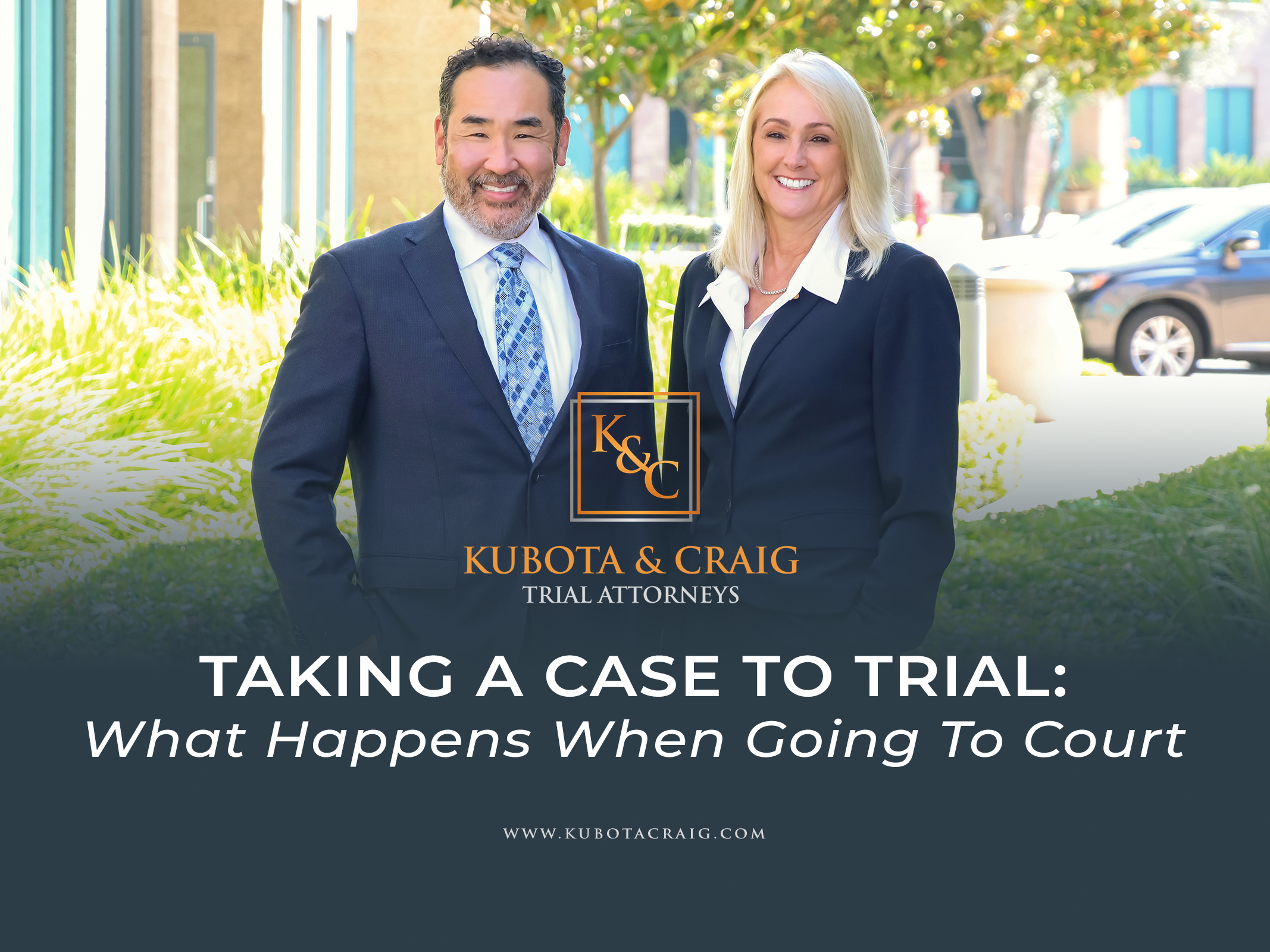Taking a Case to Trial: What Happens When Personal Injury Claims Go to Court

As a personal injury attorney at Kubota & Craig in Irvine, CA, I often encounter clients who wonder what happens when their personal injury claims lead to a courtroom battle. While many personal injury cases are resolved through negotiations or settlements, some situations necessitate taking the case to trial. In this blog post, I’ll provide insights into the process of taking a personal injury case to court, shedding light on what you can expect.
When Does a Personal Injury Case Go to Trial?
Before diving into the trial process, it’s essential to understand when a personal injury case may end up in court. While most cases are settled out of court, the following scenarios may lead to a trial:
- Disagreement on Liability: If the parties involved cannot agree on who is at fault for the accident, a trial may be necessary to determine liability.
- Disputes Over Damages: In cases where there is a significant disagreement regarding the extent of damages, a trial can help assess the appropriate compensation.
- Unsuccessful Negotiations: Failed negotiations with the insurance company or opposing parties can result in taking the case to court.
- Complex Legal Issues: Some cases involve intricate legal questions that can only be resolved through the court system.
The Trial Process
When a personal injury case goes to trial, it typically involves several stages. While each case is unique, the following steps provide a general overview of what to expect:
1. Filing the Lawsuit
The first step in taking a case to trial is filing a formal lawsuit in court. This initiates the legal process and officially notifies the defendant (the party being sued) of the legal action.
2. Pretrial Procedures
Before the trial begins, both parties engage in a series of pretrial procedures. This includes gathering evidence, conducting depositions, and exchanging information relevant to the case.
3. Jury Selection
In cases that involve a jury trial, the attorneys for both sides participate in the selection of jurors. Each attorney has the opportunity to question potential jurors to ensure a fair and impartial jury is chosen.
4. Opening Statements
Once the jury is selected, both sides present opening statements. These statements provide an overview of the case and the arguments each side will make during the trial.
5. Presentation of Evidence
During the trial, both parties present their evidence and call witnesses to testify. This stage involves the examination and cross-examination of witnesses, as well as the introduction of documents and other exhibits.
6. Closing Arguments
After all evidence has been presented, both sides deliver closing arguments. These arguments summarize the case and attempt to persuade the jury to rule in their favor.
7. Jury Deliberation and Verdict
Following closing arguments, the jury deliberates and reaches a verdict. In some cases, the judge may render a verdict if the case is a bench trial (no jury).
8. Post-Trial Motions and Appeals
After the trial, either party may file post-trial motions or appeals, seeking to challenge the verdict or specific legal issues in the case.
Why You Need a Personal Injury Attorney
Participating in a personal injury trial can be complex and overwhelming, especially for individuals without legal experience. Here’s why hiring a personal injury attorney is crucial when your case goes to court:
1. Legal Expertise
Personal injury attorneys have a deep understanding of personal injury law and courtroom procedures. They can navigate the complexities of your case, ensuring you have a strong legal advocate.
2. Building a Strong Case
Your attorney will gather and present evidence effectively, build a compelling argument, and cross-examine witnesses to strengthen your case.
3. Negotiation Skills
Even during trial, negotiations may still occur. Your attorney can engage in settlement discussions if it’s in your best interest.
4. Protecting Your Rights
Your attorney will ensure your rights are upheld throughout the trial, preventing any legal missteps that could harm your case.
Conclusion
While personal injury cases often reach a resolution without going to trial, understanding the trial process is crucial. If your case does end up in court, having an experienced personal injury attorney by your side can make all the difference. If you’re facing the prospect of a personal injury trial in Irvine, CA, contact Kubota & Craig today. We are committed to fighting for your rights and securing the compensation you deserve. Learn more about our firm here.

